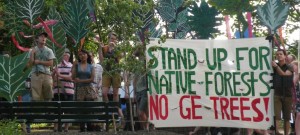Campaign to STOP Genetically Engineered Trees
FOR IMMEDIATE RELEASE
Corporate Greenwash in Tuscany
IUFRO Tree Biotechnology Conference Denounced for Promoting GMO Trees
New York (8 June 2015, 0:00 GMT) – From 8 to 12 June, Florence, Italy will be the host city for the International Union of Forest Research Organizations’ (IUFRO) highly controversial Tree Biotechnology Conference, where corporations, scientists and university researchers come together to discuss the benefits of biotechnology and genetic engineering in trees. At the last IUFRO Tree Biotechnology Conference, which took place in Asheville, NC (US) in 2013, huge protests against genetically engineered trees disrupted the five-day conference. There were several arrests. The Campaign to STOP GE Trees will be present at this year’s IUFRO conference.
The 2015 conference theme is “Forests: the importance to the planet and society and how to preserve it in the light of global climate change to meet the growing demands of society for sustainable resources, renewable energy and biomass production.” GE tree company FuturaGene is the conference’s Gold Sponsor.
In March and April 2015, organizations and social movements in Brazil and across the globe demonstrated to prevent the Brazilian government’s decision to legalize commercial development of FuturaGene’s GE eucalyptus. On April 9th, Brazil approved FuturaGene’s application. Brazil’s decision represents the first time permission has been granted to commercially develop GE trees in Latin America. The decision was immediately denounced by organizations across the world as both illegal and dangerous.
“This conference is allegedly about the importance of forests and how to protect them, yet FuturaGene, the conference Gold Sponsor, plans to develop forest-destroying GE eucalyptus plantations in Brazil,” said Dr. Rachel Smolker, Co-Director of Biofuelwatch. “Widespread plantations of non-native eucalyptus trees have already taken a huge toll on biodiversity and communities in Brazil and elsewhere. Now FuturaGene wants to expand these plantations with even more destructive GE eucalyptus trees. Their goal is not ‘protecting forests,’ but profiting from the insatiable and unsustainable demand for pulp and for ‘biomass’ for so-called renewable energy. IUFRO has put the fox in charge of the henhouse at this conference.”
On the final day of this year’s conference, Stanley Hirsch, the CEO of FuturaGene, will chair the session on the biosafety of GE trees. “The fact that Hirsch is chairing the session on biosafety exposes this conference for what it is – a farce,” stated Teresa Perez of Uruguay and Brazil-based World Rainforest Movement. “You can’t have the company planning to invade and destroy vast areas of Brazil’s unique biodiversity with fast growing GE trees lead the discussion on biosafety. Hirsch cares about profits for FuturaGene, not biosafety.”
Tree plantations of non-GE eucalyptus, pine, and palm oil and other species already growing across South America, Asia, Africa, and the Southern US have led to the destruction of hundreds of thousands of hectares of native forest. In many areas, Indigenous and forest dependent communities have been displaced for these plantations. The development of new plantations of genetically engineered trees is expected to worsen these impacts and lead to grave, unpredictable new ones.
“Indigenous Peoples have suffered violent evictions by heavily armed corporate and government-sponsored forces, and their land rights have been taken over for industrial tree plantations,” said BJ McManama of the Indigenous Environmental Network, and Campaign to STOP GE Trees Steering Committee member. “These communities are refugees in their own lands. Some are forced to relocate to city slums or makeshift tent camps on the fringes of these operations. Others lose their livelihoods and men must leave to find work, with the women and children left behind. The development of plantations of GE trees will worsen this tragedy.”
Genetically engineered trees also pose other risks to forests. These include conversion of forests to plantations, invasion or genetic contamination of forests, and depletion and contamination of water and soil. Beyond these known impacts, there are a whole host of unintended and unknown risks that have not been properly assessed in the rush to develop GE tree plantations.
“Those pushing us rapidly toward this new frontier are attempting to obscure the dangers and uncertainties of GE trees by pretending their profit-driven manipulation of nature is being done to provide sustainable and ‘green’ solutions for deforestation and climate change,” concluded Ruddy Turnstone of Global Justice Ecology Project. “It’s positively disgusting.”
The Campaign to STOP GE Trees is an international alliance of organizations mobilized to protect forests and biodiversity and to support communities threatened by the devastating impacts of genetically engineered trees.
CONTACTS
Kip Doyle, Media Coordinator, Campaign to STOP GE Trees, +1.716.867.4080 (mobile), +1.716.931.5833 (office), contact@globaljusticeecology.org
Teresa Perez, World Rainforest Movement, +598.2413.2989 (office), +598.9961.4365 (mobile), teresap@wrm.org.uy [Spanish, English]

